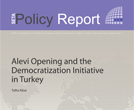It was a disappointing moment for Turks to learn that the foreign affairs committee of the US House of Representatives has narrowly voted to approve a resolution describing the massacre of more than a million Armenians by the Ottoman Empire during the first world war as genocide. Turkey recalled its newly appointed ambassador to Washington, Namık Tan, for consultation a few minutes after the vote. It is no secret that there is an “Armenian question” in Turkish-American relations, which has resulted in a seasonal oscillation in bilateral relations around this time of year for many years.
As Stephen Kinzer has noted, this vote has already harmed US-Turkish relations because it has angered many Turks. However, this year the usual political dance occurred in a different context. It may be surprising to hear, but the genocide ruling has also harmed the normalisation of relations between Turkey and Armenia. In Switzerland in October 2009, two protocols were signed by foreign ministers of both countries to set a framework for the normalisation of relations between the two and the opening of their border.
The implementation of the protocols is only possible after ratification by both parliaments. These protocols have already been a matter of serious discussion and controversy in the domestic politics of Turkey and Armenia. The Armenian constitutional court’s legal assessment of the protocols was seen to be an unconstructive move in Turkey. However, there is still a strong political will and popular support for an improvement in Turkish-Armenian relations.
After the genocide ruling, the Turkish foreign minister, Ahmet Davutoglu, underlined once again that Turkey is determined to continue efforts to normalise ties with Armenia. Davutoglu is the intellectual architect of a new foreign policy – his so-called “backdoor diplomacy” – which has the ambitious vision of “zero problems” with all Turkey’s neighbouring countries. This vision aims to not only minimise problems with neighbouring states but also constructively address any problems beyond its immediate neighbourhood. Turkey’s mediation in the indirect talks between Syria and Israel, its positive role in Lebanese and Iraqi reconciliation, mediating in the Syria-Iraq dispute and bridging the gap between Bosnia-Herzegovina and Serbia are just few examples of this.
Turkey was the first country to initiate regional shuttle diplomacy following the Russian-Georgian conflict, resulting in the creation of the Caucasus Stability and Co-operation Platform to facilitate communication between the countries of the region, including Russia. Turkey invited Armenia to the platform, and this initiative is the first of its kind, with an all-inclusive approach to addressing problems in the Caucasus. There is strong evidence that Turkish foreign policy makers would pursue the normalisation process with utmost care and sensitivity.
Davutoglu’s vision relies on a win-win strategy in regional policy with the principles of security for all, multicultural coexistence, economic interdependence and high-level political dialogue. He was right when he commented on the committee vote as the result of a lack of strategic vision. The Turkish-Armenian normalisation process also helped efforts to solve the Nagorno-Karabakh issue, such as the Minsk process and Russian mediation attempts. For the sake of such peace initiatives it is vital to keep the normalisation process alive. Any progress in Azeri-Armenian relations will have a positive impact on Turkish-Armenian relations and vice versa. The alternative is status quo in the Caucasus, which is not sustainable for regional and international security.
The genocide bill simultaneously harms Turkish-Armenian normalisation and the intensified peace attempts to solve the Karabakh problem. It is for the benefit of the US, Turkey and Armenia to pursue constructive policies for the normalisation process. There is a historic chance of making real progress in Turkish-Armenian relations, which is likely to make the Cauc
In this article
- Domestic Policy
- 2009
- Armenia
- Azerbaijan
- Azerbaijan-Armenia Conflict
- Bashar Al Assad
- diplomatic
- Foreign Minister
- Genocide
- Iraq
- Israel
- Karabakh
- Karabakh Conflict
- Middle East
- mistake
- over
- Russia
- Serbia
- SETA
- Syria
- Syrian Civil War
- Syrian Conflict
- Syrian Crisis
- Turkish Foreign Policy
- Turkish-American Relations
- Türkiye-US Relations
- Türkiye's Foreign Policy
- U.S. House of Representatives
- United States (US)

